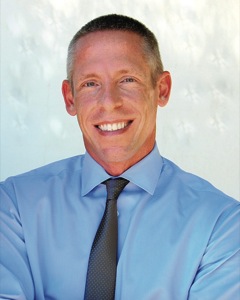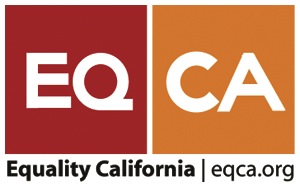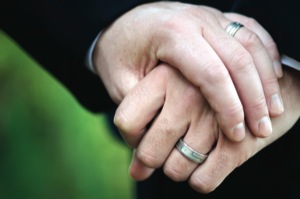
John O’Connor was appointed as executive director of Equality California (EQCA) December 2012. O’Connor brings much experience to the role with more than 15 years of cause-related work and a strong record of accomplishment.
In his previous role as executive director of the LGBT Community Center of the Desert, O’Connor planned and executed a complete turnaround and restructuring of the organization with strong results including a more engaged board of directors, a new identity, a dramatically improved reputation and robust new programming.
In a recent visit to San Diego O’Connor found time to talk to San Diego LGBT Weekly and tell us of his vision going forward with Equality California.
San Diego LGBT Weekly: 2012 was a momentous year for LGBT equality. How can EQCA capitalize on that and keep the momentum going in 2013?
John O’Connor: Well, 2012 was an extraordinary year for LGBT equality, and after the inauguration, 2013 is shaping up to be an extraordinary year as well; and all of this momentum and attention gives us an opportunity to illuminate the range of concerns within the LGBT equality movement.
Marriage equality is the big thing that’s going on this year with the cases in the Supreme Court and, of course, it’s a nervous time and we just have to wait. At the same time, there’s a range of issues that remain out in the field, front and center of EQCA’s work, and the heightened attention that LGBT equality has been given by these historic events gives us an opportunity to talk about them.
There is the need, for EQCA to focus some of its time and attention on the enforcement of legislation and laws that have been passed which sit on the books and have never fully been enforced.
For example, the urgent need to have safe schools where LGBT young people are protected and not subjected to bullying and harassment; the concerns of seniors, many of whom have to go back into the closet as they enter nursing homes and long term care facilities; the concerns of transgender people, many of whom face terrible harassment and discrimination in their everyday lives.
In terms of upcoming legislation in 2013 what are EQCA’s priorities in moving equality forward for all LGBT people?
Well, powerful legislative advocacy is very important, and will always be very important and we don’t have our legislative package to announce yet.
The things that I can tell you about that are priorities for EQCA are the enforcement of existing legislation.
A great example of that is the audit of the safe schools legislation that is currently underway. We find out the results of that audit around summer time, and we fully anticipate the types of things that audit will expose.
That is that kids continue to be bullied and harassed in schools by their peers and sometimes even by their teachers, rather than being protected. To avoid confrontation and punishment they continue to skip school at alarmingly high rates, drop out of school, or run away from home. They are certainly not learning when they are scared to be there in the first place, and it’s an outrage that the state of California has failed to protect our young people. So advocacy on that issue, for example, is one area that we will focus a priority amount of our attention.
The arena of health is definitely a priority for EQCA. The implementation of the Affordable Care Act and the launch of Covered California, the Health Exchange here, present an opportunity for us to directly address the disparity and access to healthcare that LGBT people face.
So those are a couple of the priorities that we are looking at for the year.
What new strategies will you be implementing to further strengthen the effectiveness of EQCA in backing equality legislation, and supporting all LGBT Californians?
On the safe schools we will be directly advocating with school districts across the state and legislatures. Outreach to the press is a particularly powerful strategy when it comes to the enforcement, implementation and attention on the failure of school districts.
There are more than 1,100 school districts in the state of California so certainly we can’t go door to door to each school district but illuminating the problem through press and advocacy are strategies that we will employ.

With the health project we will mobilize our field staff into communities to educate people to talk about the Health Exchange. That is going to be a massive undertaking for us and we are looking to host enrollment fairs in communities across the state. So that’s going to be a big, big piece of work for us that we are building a capacity for.
With even some social conservatives now accepting marriage equality as inevitable, how do you feel the overall political climate toward equality is changing across all parties?
The pace at which LGBT people have increasingly found political power and acceptance in institutions throughout society, communities of faith and various political parties is incredible. There is still a long, long, long way to go in our work for full LGBT equality for people to understand and embrace us in all our diversity.
I think that our opposition, whatever party they might be in, who are opposed to LGBT equality, or whatever issue, will remain our adversaries for a long time to come. But I think there is a growing acknowledgement that we are ultimately winning the struggle for full equality.
However, I don’t think the opposition is throwing in the towel. So we have a couple of notables in the party that are traditionally conservative, acknowledging that LGBT equality is perhaps unstoppable and that’s wonderful! But that does not mean they are packing up and going home.
How do you think the Supreme Court will rule on DOMA and Proposition 8?
I can’t predict and I will decline to predict. Sorry to disappoint your readers, but I’m not offering any predictions today!
I can tell you that the arguments going in front of the Supreme Court on our side of these issues are solid, and I have faith in the process; and I have faith that they will be given a just hearing; and I have faith that ultimately we will achieve full marriage equality.
What effect do you think President Obama’s inauguration speech might have on The Supreme Court ruling?
I think it is likely to have a strong effect, but how the Supreme Court Justices will finally rule is hard to say. President Obama’s inclusion of LGBT people and the way he did it in his inauguration address was wonderful and I think I felt it in my heart in a way that I haven’t felt it before. The significance of having the leader of the free world acknowledge us in such a thoughtful way. Feeling that way resonated with me and made me recognize what a huge thing that was, and what a huge thing that was for LGBT Americans and LGBT people throughout the world. It is certain to have a big, big, big effect. Whether that effect spills over onto how the Supreme Court decides the LGBT cases in front of it I do not know. It is my hope that it will positively impact them.
There are a number of LGBT advocacy groups, all with their own agendas. Do you feel there could be closer cooperation between these groups to strengthen the call for equality?
Well I can’t speak for all of the groups, but between EQCA and our partners in the field, not only should there be, there is going to be, [closer cooperation]. That has been an initial priority for me, and I have been reaching out all over the state.
I’ve met with Delores Jacobs and initiated my relationship with her; and The Center down here, Lori Gene at the L.A. Center is a friend and somebody who I am happy to be working with now. Kate Kendal at The National Center for Lesbian Rights is also a friend who I have been meeting with to discuss collaboration. Shannon Minter on Kate’s staff is working with me on our lawsuits to protect SB1172; and Mason Davis of The Transgender Law Center is working with me to explore the possibility of collaboration between EQCA and the Transgender Law Center.
So, not only should there be, there is now a higher level of collaboration!
Do you see EQCA working with the national advocacy groups?
I think the alignment is a friendly level of coordination and mutual support, but as you said, we do advocacy primarily around legislation in the state of California so our niche is kind of carved out in a way. So there is room for mutual support and friendly coordination; not a lot of directly collaborative work. For us, the natural prospects for collaboration are California-based organizations.
Anti-LGBT bullying is still a problem, especially among young people. What more can be done to prevent this kind of discrimination?
You know, given that our focus is on government and public policy legislation in particular, we have been party to passing laws to protect kids in schools. Because school safety and bullying is a priority concern to us, and it is a concern of many people across the state we sponsored a demand for an audit on that legislation, which was sponsored by Assemblymember Ricardo Lars.

The governor signed it into law so that audit is underway now. The state auditor is auditing school districts across the state for their compliance with legislation to provide a safe environment for youth. As I mentioned before the results of that audit will be released over the summer.
Would you consider EQCA taking a more hands on approach to the problem of bullying?
This hasn’t been brought up for consideration. We are in what I would characterize as “the program development phase” of looking at this problem and trying to develop a strategy. As I mentioned, there are 1,100 school districts in the state of California and they are governed locally. My first meeting to discuss this was with the Superintendent of Education Tolykson in Sacramento, so we have begun our dialogue with the Department of Education on how we might approach advocating for the full implementation of these laws.
We are still looking at many different options so I can’t tell you exactly what the advocacy strategies are going to be, but that project is a priority for us this year.
Are you in favor of a hands-on strategy in this area?
Sure I’d be in favor of any tactic that got results.
As we all know, the reparative therapy bill is now on hold and has not been implemented. Do you feel that law will be ultimately sustained?
I think so. I think the arguments and the rationale for the legislation in the first place was rock solid and therefore the arguments going in front of the court will be rock solid as well.
Look, every major mental health medical association out there has come out against sexual orientation change efforts. They have found it abusive and harmful.
If we look at the recommendations of how young people struggling with their identity or sexual orientation should be embraced and supported, certainly not abused, and that attempts to change them should not be employed. Well, it’s like polar opposites. The state protects young people from tobacco, from alcohol, even from tanning booths! The state is certainly well within its rights to protect young people from this and I think the court will agree.
As we are all aware, the news has broken that there are moves to rename SFO after LGBT icon Harvey Milk. If successful, what kind of impact do you think this will have in California, the rest of the nation and overseas?
There are two profound effects that come to mind for me. One will be the opportunity to educate the world on Harvey Milk’s legacy because people who don’t know who Harvey Milk is will fly through San Francisco Airport and they will hear about who Harvey Milk is.
San Francisco International Airport serves 70 plus countries. In so many of those countries, being gay or lesbian is explicitly outlawed, so the visibility this airport will give to LGBT equality globally could have a profound effect on international dialogue around these issues.
But for young people, and for all people who are LGBT to see Harvey Milk’s accomplishments, as an LGBT person, held up to the same level of other non-LGBT people from all walks of life is a point of dignity and should not be overlooked. Harvey Milk is a hero to our community. To put him on a level footing with other leaders is extraordinary.
In the fight for equality, how important is San Diego and the actions of local advocacy groups. How can EQCA become more involved locally and what can San Diegans do to become more involved with, and aware of EQCA?
We have four elected officials from the area representing San Diego in Sacramento who have received EQCA’s endorsement in their race for their seat. First there’s Toni Atkins, who is part of the LGBT caucus; of course Sen. Marti Block; Ben Hueso and Shirley Weber. And then we have Juan Vargas’ seat which is being vacated and there is a special election coming up. EQCA will certainly be making an endorsement in that we have a powerful sought-after endorsement and if people in this community want to be a part of the work of EQCA – a statewide pro-equality organization – we want 100 percent pro-equality elected officials in Sacramento representing them.
Then they can get involved with these elected officials who have our endorsement. We have a policy of “100 percent pro-equality platform or no endorsement”, and there is never any exceptions made to that. It is a point of great integrity for our organization so supporting those candidates, those elected officials is one way.
Another way that we will be involved in the community, I talked about enrolling people in the Health Exchange. We will be doing an enrollment fair down in this area for lower income LGBT people. People who need access to healthcare and want to know about the exchange will be contacted by us. We would also be doing a call for our volunteers, because we’ll need all the help we can get. We have two events, and people can participate as attendees or donors at these events. We do a garden party here and an Equality Awards event.

So those are ways. We also have a board member on our board who is a leader, Joyce Rollin. She is an executive at Sempra down here in San Diego and she is my connection to the community and the board who could do some recruiting for us. Geographic diversity is a priority for us; having more representation from down here is a priority for us, and I would like to expand our reach a little bit.
Fast forward to the end of 2013. What would you like to be looking back on as achievements by EQCA and LGBT equality as a whole?
It is my hope that the Supreme Court will have ruled favorably and marriage equality is restored in California at the very least. That is a hope.
I think with all the momentum and heightened publicity with LGBT equality that we would have been successful in elevating school legislation; that we have a collaboration for transgender equality launched with our partners in the field. It is further my hope that we’ve had a successful year legislating protections for LGBT people; that EQCA is more visible in San Diego and across the state, and that we have restored our capacity that we lost in the transition we’ve been through recently. Lastly, that we have a clear vision for the future for ongoing work for many years for building am understanding and public support for LGBT equality.
There is nothing but opportunity for us right now. We are not going to close up and go home. But mission accomplished? No. The mission for full and lasting equality for LGBT people is far, far, far off still. There will always be a need for it, but we’re shifting the political landscape. This landscape is changing very quickly and political power to protect what we have, to enforce what we have and to fully implement what we have is crucial.











